by John Byrne Barry | Jan 23, 2017 | Uncategorized
My wife and I had planned on walking together in the Women’s March this past Saturday. But pressing family issues came up on Friday, she had to cancel, so at the last minute, I signed up to be a marshall at the march, a “peace ambassador,” and I arrived at at Madison Park in Oakland early Saturday morning, where I got an orientation and a neon yellow vest.
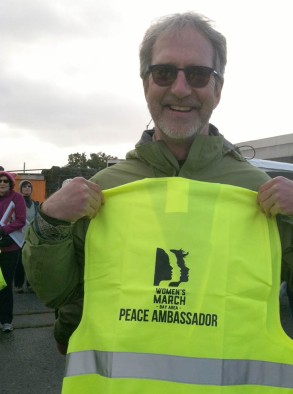
The park was still pretty sleepy at 8 a.m. Elderly Chinese were doing tai chi and badminton volleys on the west side of the park, and on the east side, a dozen or two volunteers were gathering and chatting. The sky was overcast, but there was no rain, and the sun peeked through now and then.
We all teamed up with buddies and one member of each team got a radio, and then we went over the route and various contingency plans. They divided us into groups by where we were standing and I ended up as one of three dozen or so volunteers whose job it was to create a wedge in front of the lead banner, clearing the center of the street for the march and creating enough space in front for photo ops.
This proved to be more complicated than I imagined. By the time we left the park, shortly after 10 a.m., the streets were so packed with people, we had to clear a path before the march could start.
At 9th and Oak Street, about 30 to 40 of us peace ambassadors held hands, formed a V-shaped wedge, and walked north on Oak Street, gently herding people from the center of the street to the sides. We walked about two blocks, trying to hold the space behind us as we moved forward. Then about half of us turned around, and went most of the way back, to where the folks holding the lead banner had set up, across four lanes of Oak Street. A man named Stefan with a megaphone was directing us — it felt like a military operation even though we were marching for peace.
(One fellow marshall noted, that of course, we had to have a man with a megaphone giving orders at the front of a women’s march. But he knew what he was doing, and the vast majority of the marshals in the front and the people behind the lead banner were women.)
Later on Saturday, someone shared a CNN video on Facebook of marches throughout the county, and there I was in the upper left corner of a clip from Oakland. With my fanny pack and bald spot on the top of my head. You can see the space we created in front of the banner.
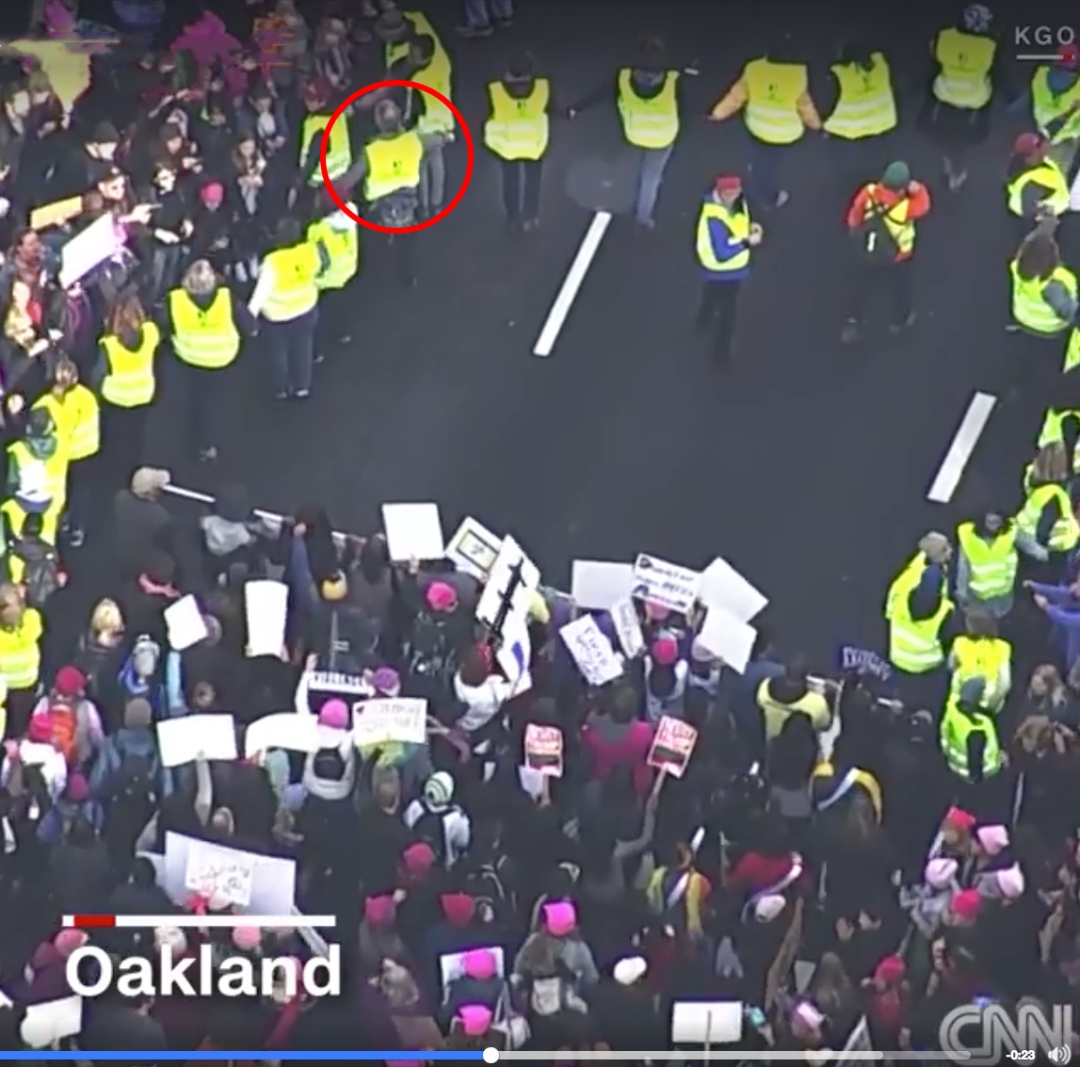
Here it is from further above. See that empty space behind the wedge.
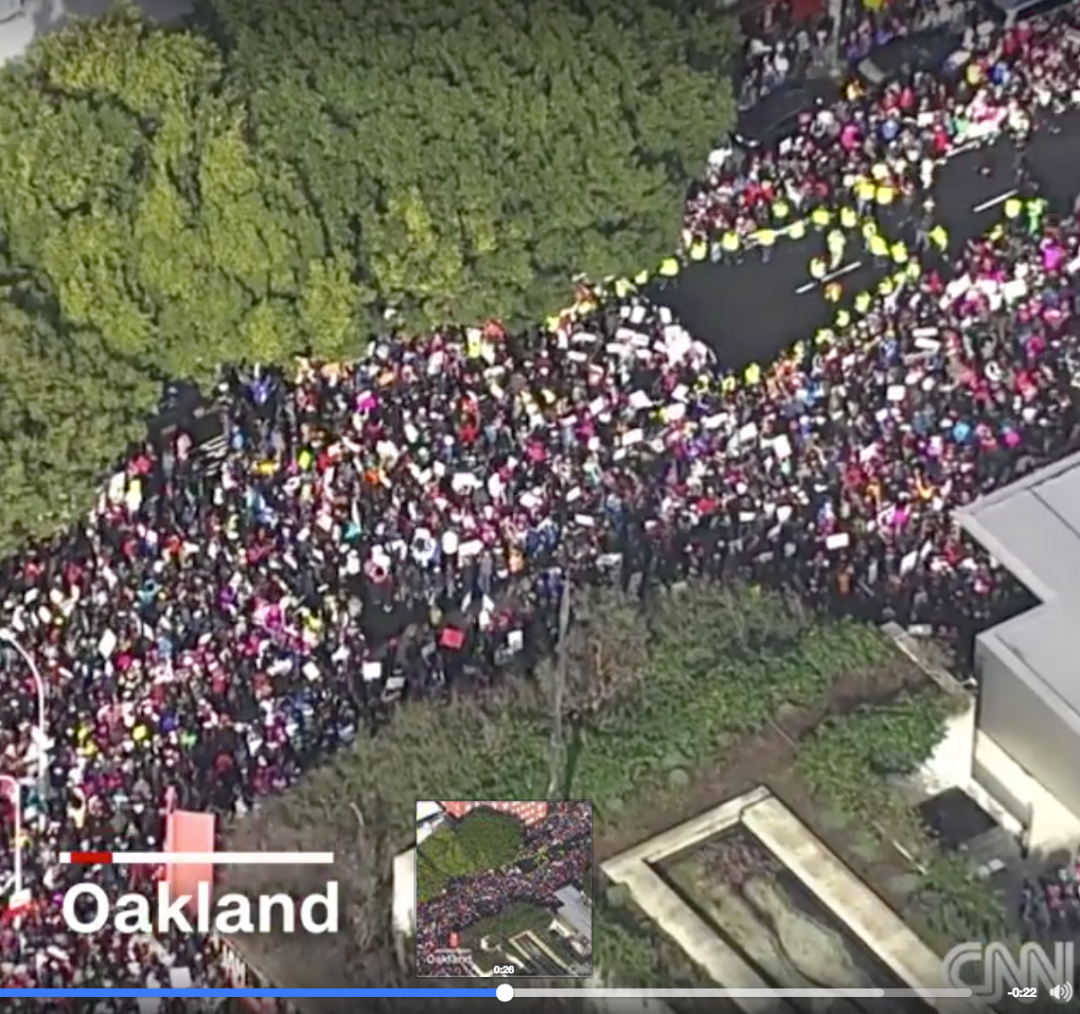
And here’s what the lead banner looked like from the front. (Photo by James Lerager.)
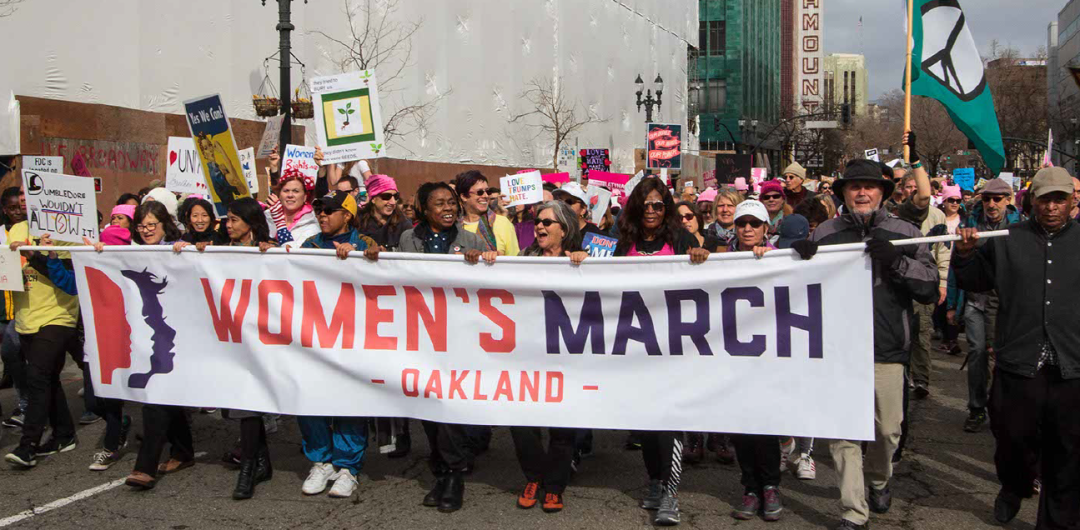
We started marching. We were directed to slow down, speed up, and now and then to stop and kneel, so photographers could get a better photo. “If only,” someone quipped, “someone was documenting this amazing march.” If only.
One of my buddies, Lily, was at the apex of the wedge for most of the march. I shouted over to her at one point, “Hey, Lily, I bet you weren’t expecting you’d be leading the march.” She shook her head and smiled.
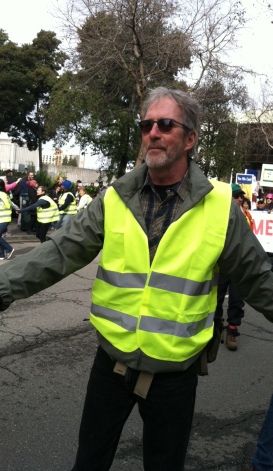 I was on her left, about three or four people away, walking sideways for much of the march, holding hands with Jane, my other buddy, a few feet ahead of me on my right, and a man whose name I never learned a few feet behind me on my left. Sometimes both my arms were being pulled, in opposite directions. We didn’t always stay in formation, but the wedge worked the way it was supposed to. I had never given much thought to how to manage a march. It was harder than I expected, especially with crowds in the tens of thousands. We heard estimates ranging from 60,000 to 100,000. I was in no position to assess the size of the crowd, other than it was larger than organizers expected. And everyone was peaceful.
I was on her left, about three or four people away, walking sideways for much of the march, holding hands with Jane, my other buddy, a few feet ahead of me on my right, and a man whose name I never learned a few feet behind me on my left. Sometimes both my arms were being pulled, in opposite directions. We didn’t always stay in formation, but the wedge worked the way it was supposed to. I had never given much thought to how to manage a march. It was harder than I expected, especially with crowds in the tens of thousands. We heard estimates ranging from 60,000 to 100,000. I was in no position to assess the size of the crowd, other than it was larger than organizers expected. And everyone was peaceful.
The energy, the camaraderie, the creativity, the love was palpable. It felt as much like a celebration as a protest, though of course, the signs were defiant.
Some of my favorites.
“Girls just want to have fun-damental rights.”
“You’re so vain, you probably think this march is about you.”
“The future is female.”
“We are the wall.”
“I would not want to be the guy who pissed all these women off.”
A wonderful day. A wonderful march. I’m so grateful I stumbled into the opportunity to lead it. Sort of.
I’m going to treat this experience as if it’s a metaphor for something. Now I just need to figure out what it is.
Thanks to all the hard-working folks who organized the march. Now we start the really hard work.
—
If you haven’t already gorged on march photos, here are more from the Oakland march, courtesy of James Lerager.
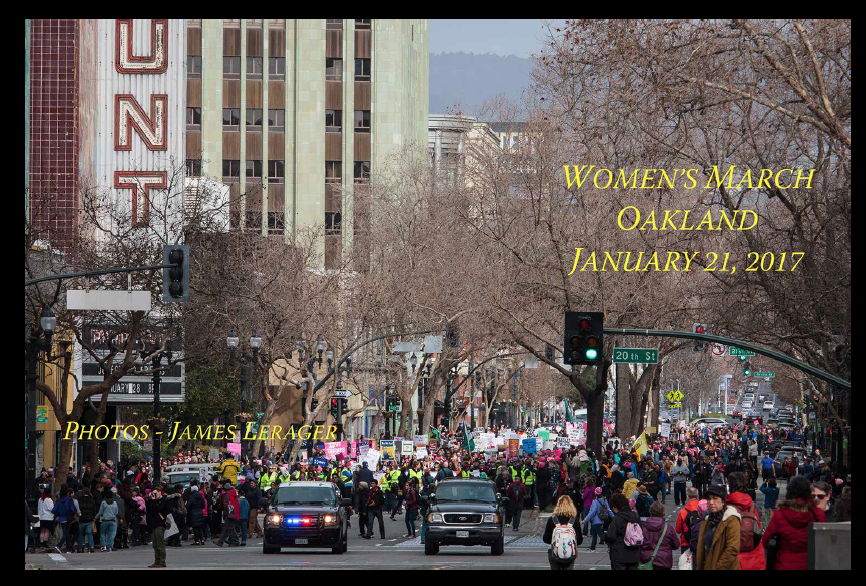
by John Byrne Barry | Oct 19, 2016 | Albuquerque to Berkeley, Bones in the Wash, Page-turners with a Conscience, Wasted

(Here’s a distilled version of the author talk I gave at the Great Valley BookFest in Manteca on October 8. Thanks to Toni Raymus for inviting me.)
I’m skeptical about branding. Sure, everyone knows that 15 minutes can save you 15 percent on lizard skin. But I’ve sat through enough branding meetings over the years to decide a brand wasn’t relevant for me as an author.
Until I came up with one.
This past summer, I was asked for a title for my talk here at the Great Valley BookFest. Four words or less. I came up with “page-turners with a conscience.”

After my author talk at the Great Valley BookFest in Manteca.
I wasn’t thinking brand then, just title, but it is a brand, my brand — a distilled marketing message that defines who I am and what I write.
I didn’t have this brand in mind when I wrote my two novels, but it was there in the back of mind. I hadn’t found the words. Arguably a brand is more important for marketing than writing, but having this brand is already helping me write my third novel. (A family drama about euthanasia.)
I know I want the story to race like a rollercoaster, but give the reader something to think about.
I’ve been a reader all my life. I can’t imagine life without reading. My father was an English professor and my brother is as well, so I’ve read my share of literature.
But I’m a lazy reader. If something doesn’t grab me, I stop reading. I’m not in school anymore. I don’t have a test to ace or a paper to write. So I read a lot of mysteries and suspense. I love reading a book I can’t put down.
Take The Firm, by John Grisham, who’s laughing all the way to the bank. Twenty-plus years ago, I stayed up till 3 am at camp reading it by headlamp. It tore to the finish. But it was ridiculous. The protagonist took on the mob and the FBI with one hand behind his back. To make the plot sprint, Grisham sacrificed character development and believability. And there was nothing to think about once the book ended.
What I want to read and write are books that move like The Firm, but with three-dimensional characters, believability, and some sort of moral dilemma or nuanced choice that gives the reader something to think about.
Now to the conscience part. What ties my books together — I have digitally combined them in Albuquerque to Berkeley: Two Election-Season Thrillers, for only 99 cents — is the daunting challenge of doing the right thing. Not just in politics, but in family, love, and murder.
In my first novel, Bones in the Wash: Politics is Tough. Family is Tougher, set during the 2008 presidential campaign in New Mexico, ambitious Albuquerque Mayor Tomas Zamara is charged with doing “whatever it takes” to deliver the state’s five electoral votes for John McCain. He has a strong sense of right and wrong — one of my friends said, I know you’re writing fiction, because your protagonist is a Republican with integrity. But Mayor Zamara understands that politics is like playing football on a muddy field. If you don’t get dirty, you’re not giving your all.
In Wasted, Brian Hunter, a wannabe investigative journalist covers the “recycling wars” in Berkeley, finds the body of his friend Doug crushed in a bale of aluminum, and sets off to find the murderer, all the while chasing Doug’s ex Barb, now a suspect in his murder. Brian is convinced that the big bad corporation, Consolidated Scavenger, is responsible for the murder, and blinds himself to the possibility that it could be Barb.
At the center of Wasted is an idealistic, but dysfunctional collective called Recycle Berkeley, or Re-Be. What I aimed to do, and succeeded, according to many of my readers, is portray this collective as the good guys, well-intentioned, but flawed in huge ways. And the bad guys, Consolidated Scavenger, aren’t all bad. They have a record of taking over companies and using their lobbying muscle to influence regulation, but they’re also more efficient than Re-Be, and less corrupt than many of the companies they’ve absorbed. And though Brian would like to peg them for this murder, he can’t unearth any evidence they killed Doug.
In short, I’m attracted to things that aren’t black and white. To the fifty shades of gray in between. (I might have grabbed that as a brand, but it was taken.).
That’s why I like this “page-turners with a conscience” brand — my books are entertainment more than literature, but they’re not just galloping plots. The characters face tough moral choices.
My goal is to aim for that sweet spot between best-selling mindless entertainment reading and literary masterpiece.
Though my writing style and subject matter are totally different, I’ve been very influenced by the British spy writer John Le Carre — I’ve read about 20 of his books. His early Cold War books, the good guys, the Brits or Americans, are often very compromised. In their zeal to defeat the Soviets, they become just as bad as they are. Of course, the life of a spy is characterized by deception.
One of the first books of LeCarre that was not about the Cold War was Little Drummer Girl, which starred an Israeli secret agent who went undercover as a Palestinian, and as he becomes more embedded in Palestinian society, he understood their situation more and it became harder for him to see things in black and white.
I’m going to read a scene from Bones in the Wash, featuring Mayor Zamara’s antagonist, Sierra León, a precocious hometown girl who’s made good a political operative, and has returned to Albuquerque from Washington D.C., to run a statewide coalition supporting Obama.
As editor of her high school newspaper, she covered Zamara when he was a city council member, and later, for the University of New Mexico Daily Lobo, his campaign for mayor. He doesn’t know her, but recognizes her face and her name. She pressures him to live up to his reputation of integrity, but he doesn’t, and the dirty tricks he engages in work. This drives Sierra crazy, and this scene is her talking with her father about this over dinner at an outdoor cafe.
“The thing is,” said Sierra, “I feel like such a chump playing by the rules. It’s not just being punked. It’s them shutting down voter drives, running sleazy racist ads. Cliff says we should play dirty, and I don’t want to, but I’m starting to think he’s right. Integrity is just a selfish indulgence.”
“You don’t believe that, do you?”
“I don’t know what to believe. I mean, I’m a model citizen. I don’t litter. I bring in milk for coffee and other people use it without ever buying any themselves. I play by the rules and it doesn’t make any difference. The goopers are cheating left and right, but all the news is about us cheating. Their lies carry more weight than our truth.
“You know, you look at the news and what people talk about and you get the impression that the nitty-gritty of politics is the people running, their characters, their positions on the issues, and of course, that’s partly true. But underneath that is this whole business of setting rules, like who can vote and when, and the Republicans are evil genius and meta on that front. I hate it that I actually admire what they did even as I despise it. If they can manipulate the rules so it’s harder for the poor and young and old and disabled to vote, then they have an advantage no matter how weak their candidate is.
“They just ran this sleazy, racist ad too, well, a third-party group did that, but I’m sure the McCain campaign knew about it. We’re a third-party group and we take seriously this rule that we’re not supposed to coordinate with the Obama campaign, but right-wing groups ignore this rule blatantly, and never get called on it, except by us, but then they just say, oh, it’s partisan attacks. That’s what’s so infuriating—”
“Slow down, mija.”
“If only there were some impartial referee, like at debate club, some thoughtful observer who says, well, you got more votes, but you broke the rules, so we’re going to subtract points. The right does whatever it wants, rules be damned. I’m just so tempted to get down in the gutter and give them a taste of their own medicine. I can feel the blood lust.”
“What would that mean?”
“Well, we’ve been doing some oppo research. Opposition research. Not so much McCain as his local surrogates, like the mayor, who has a reputation for being a clean, straight-and-narrow kind of guy, but that’s just an act. He has skeletons in his closet too—and I don’t just mean the bones of his wife in the wash. I covered her disappearance when I was at the Daily Lobo, and before that, his campaign for mayor. In between, there was some scandal that didn’t get much play.”
Her father wasn’t nodding his head, but he was listening intently. He licked his lips, rubbed his cheek with his hand.
“We could make a big deal about that,” she said, “sully his reputation. I mean, this is not how I like to operate, with personal attacks and all that, but after what he’s done, he deserves it. This insistence on being honorable gets in the way. When the stakes are high, it’s a liability—”
Lamar didn’t wait for her to stop. “So you want to fight the bad guys by acting like them?”
“I don’t want that. I want to win. That’s why I’m going zombie over this.”
“Can I tell you a story?”
She nodded. She knew she didn’t have a choice.
“You eat.” Lamar had cleaned his plate and drunk his beer. Now it was getting cool. He buttoned up his long-sleeve shirt, wiped his mouth again with the threadbare turquoise napkin.
“Once upon a time there was a farmer who was gearing up for spring planting when his horse ran away. When he told his neighbor that afternoon, the neighbor said, ‘That’s terrible news. Disastrous. How are you going to get your beans planted?’
“The farmer shrugged his shoulders and said, ‘Bad news, good news, who knows?’”
Sierra, with her mouth full, waved her fork. “You told me this before,” she said, “but go ahead, please.”
“I’ve also told you before to slow down and not talk with food in your mouth,” he said, signaling the waiter for another beer. She made a face at him. “The next day, the horse returned with a wild white stallion, strong and spirited, and the farmer reported this to his neighbor, who said, ‘That’s great news. You’ve got another horse to help with the plowing.’ The farmer says, ‘Good news, bad news, who knows?’
“The next day, the farmer’s son started training the stallion to pull the plow, and the horse threw him off and he landed hard and broke both legs. When the farmer told his neighbor, he said, ‘What bad news. You were counting on your son for the planting. How can you possibly get the ground ready for your beans without him?’
“Of course, you know where this is going. The farmer says, ‘Bad news, good news, who knows?’ And then the next day, the king’s men come to conscript able-bodied young men into the army to fight the Mongols or whoever. The farmer’s son can’t even walk so they don’t take him. Predictably, his neighbor is ecstatic. ‘This is great news.’
“Whereupon the farmer says, ‘Good news, bad news, who knows.’ And so on.”
Sierra held up her fork to take the floor, but finished chewing first. “So what you’re saying is if we lose the election, I shouldn’t jump off a bridge because some day in the distant future, I might get a pony. I don’t think you understand the gravity of this situation.”
(Read more of Bones in the Wash at bonesinthewash.com.)
I have one more reading before Election Day — Sunday, October 23 at 2 pm at the Tam Valley Cabin on Tennessee Valley Road in Marin County.

Election-Season Author Tour poster
by John Byrne Barry | Sep 22, 2016 | Albuquerque to Berkeley, Bones in the Wash, Wasted
 I wish I could say I’ve written and published a new book. That’s half true. I’ve published a new book called Albuquerque to Berkeley — Two Election-Season Thrillers. What’s new is the packaging, not the pages. (All 677 of them — that’s the estimate of Kindle “pages.”)
I wish I could say I’ve written and published a new book. That’s half true. I’ve published a new book called Albuquerque to Berkeley — Two Election-Season Thrillers. What’s new is the packaging, not the pages. (All 677 of them — that’s the estimate of Kindle “pages.”)
To “celebrate” the political season, I’ve brought together my two novels — the award-winning Bones in the Wash: Politics is Tough. Family is Tougher, set during the 2008 presidential campaign in New Mexico, and Wasted, a “green noir” mystery set in the Berkeley recycling world, against the backdrop of a pivotal city council race.
What ties the books together is the daunting challenge of doing the right thing. Honesty is the best policy, right? Except maybe in politics, family, love, and murder. In Bones in the Wash, ambitious Albuquerque Mayor Tomas Zamara is charged with doing “whatever it takes” to deliver the state’s five electoral votes for John McCain. Though he has a strong sense of integrity, he knows politics is like playing football on a muddy field. If you don’t get dirty, you’re not giving your all.
That’s why I call these novels “page-turners with a conscience” — I’m aiming for that sweet spot between trashy beach reading and literary masterpiece, where the plot gallops like a racehorse, but the characters are three-dimensional and face tough moral choices.
In Wasted, Berkeley reporter Brian Hunter investigates the “recycling wars,” finds the body of his friend Doug crushed in an aluminum bale, and hunts down the murderer, all the while trying to win the heart of Barb, Doug’s former lover, now a suspect in his murder. In his zeal to tell the truth about the threat of a corporate takeover of the local recycling collective, he tells a few white lies to get information. And maybe he keeps some of the truth to himself instead of publishing it. It’s a murky business, this truth-telling.
(Here’s veteran journalist Mark Mardon’s take on Wasted: “It’s a colorful cast and crew you’ve assembled to tell this rowdy romp, which tells more about journalism than about recycling. Using the recycling industry as a way to get into the slimy business of journalism keeps this from being a ‘message’ book about the virtues of recycling. It’s more about the shady business of hunting down a good story.”)
Albuquerque to Berkeley is only $3.99 — for two election-season thrillers. Tell your political junkie friends.
by John Byrne Barry | Sep 2, 2016 | Bones in the Wash
How and Why I Gave Away My First Book to Attract New Readers to My Second
Despite the headline, I’d prefer to frame my book giveaway as an experiment, not a failure. I tested the strategy of making my book free and got definitive results — fewer sales or reviews than my modest projections. A successful experiment, but a failed strategy.
 My hope was that by giving away my well-received first novel — Bones in the Wash: Politics is Tough. Family is Tougher. — I would gain sales for my second book, Wasted, a “green noir” mystery set in the Berkeley recycling world, as well as more reviews.
My hope was that by giving away my well-received first novel — Bones in the Wash: Politics is Tough. Family is Tougher. — I would gain sales for my second book, Wasted, a “green noir” mystery set in the Berkeley recycling world, as well as more reviews.
I published Bones in the Wash more than two years ago, and, being new to book marketing, didn’t realize that unless I tirelessly flogged the book, no one would know about it, let alone buy it. I hosted a fun and successful book launch at a cafe near my house in Berkeley, which attracted more than 50 people and I gave talks at the California Writers Club in Berkeley and Marin. I wrote blog posts and pitched the book on Facebook, Twitter, and GoodReads. I started an email newsletter, and sent notes to friends and colleagues.
I tried a variety of blurbs. Here’s one:
One half political thriller, one half family soap, and one half murder mystery — that’s right, it’s a novel and a half — Bones in the Wash careens through the pressure cooker of the 2008 presidential campaign in New Mexico, where straitlaced Albuquerque Mayor Tomas Zamara grapples with a fierce opponent, a volatile new woman, a demanding family. Oh, and he’s a suspect in his wife’s murder.
Response to the book has been heartening. I now have 60 reviews, including the most recent one, just posted a few days ago.
Five Stars: I didn’t want to have to put the book down when I had to.
And last December, I was thrilled to win the Best Book 2015 from the Bay Area Independent Book Publishers Association (BAIPA). My award even included a $200 check. Did it increase sales? Not much. I posted about my award several times in several places, and it barely moved the needle.
Doesn’t make much difference that the book is good if potential readers don’t know it exists.
I had read many posts suggesting that making your ebook free was a way to find new readers who then might write a positive review and/or purchase your other books. That sounded like a good plan.
I heard a presentation at a California Writers Club–Berkeley meeting by South Bay author Chess Desalls, about how she’s gained readers for her series of four young adult time travel books with a BookBub promotion. For a price, BookBub promotes your free or discounted book to its email list of millions. But BookBub is tough to crack. I submitted Bones twice and was rejected twice. (Desalls did suggest that a giveaway is more likely to be effective for a series — my two novels are distinct, with different characters, different settings, even different genres.)
Despite the BookBub rejections, I have succeeded in getting my free ebook downloaded by more than 5,000 potential readers, far more than I expected. With minimal promotion.
My first step was uploading a new digital version of Bones in the Wash, with an ad for Wasted at the beginning, and a letter to the reader at the end, asking for a review, and suggesting they might like Wasted. Then I made the book free on Smashwords. Amazon will not let you set the price to free, but they will match the lower price elsewhere. (I did, as suggested, first lower the Kindle price from $2.99 to $0.99)
Nothing happened at first. Then I asked four different people to go to the Amazon page and click where it said “lower price elsewhere.) The price stayed at $0.99. Then, a week later, Amazon changed it to free.
The next day, without me doing anything, Bones showed up as a featured free ebook on Digital Book Today, as one of the Top 100 Free Kindle Books on Amazon.
 On its first morning, it was one of the top 10 downloads. Within the first week, more than 3,000 people downloaded the book.
On its first morning, it was one of the top 10 downloads. Within the first week, more than 3,000 people downloaded the book.
Because this was an experiment, I set some goals, which I thought were extremely conservative. I estimated that I’d get one sale of Wasted or the paperback version of Bones in the Wash for every 100 ebook downloads. Here were my projections for April and May.
| April 1 |
15 |
25 |
5 |
| May 1 |
35 (cumulative) |
60 |
10 |
The downloads kept coming. By June 1, there were more than 5,000 downloads, many times more than the number of books I’ve sold.
The sales and reviews trickled in. Slowly. One here, two there. Two five-star reviews showed up on Amazon. But mostly, nothing. Except more downloads, and even they tapered off.
I got a little obsessed, checked my sales and reviews three, four times daily. I reminded myself that it takes people a while to read the book. They might have other books in their queue ahead of mine. They might like to download free books, but not read them.
Soon enough, I realized my modest 1 percent estimate was too high.
Because I was busy with other things and thought this promotion would spur sales more, I did hardly any other marketing, so I presume most of the sales and reviews I did get were as a result of this giveaway gamble.
I included my email in the book, and got two notes, including a lovely one from woman who’s been fighting voter suppression and appreciated that I was able to illustrate that issue in an entertaining way, and that my protagonists demonstrated integrity and bravery. (She also said she was going to pick up Wasted, and there was a purchase the next day, though Amazon doesn’t tell me who the purchaser is.)
Here are my numbers as of August 15.
| March |
4423 |
9 |
15 |
5 |
30.20 |
| April |
337 |
2 |
4 |
5 |
11.36 |
| May |
373 |
3 |
1 |
4 |
12.23 |
| June |
38 |
6 |
0 |
0 |
14.20 |
| July |
24 |
1 |
1 |
0 |
3.95 |
| August |
22 |
0 |
0 |
1 |
0.00 |
| Totals |
5141 |
21 |
21 |
15 |
71.74 |
Note: The Bones sales include international sales of the ebook, as well as paperback sales.
So the book sales, of 42, which most certainly include some sales not related to the free promotion, amounts to 0.8 percent of downloads. Not too short of my goal. Maybe it’s better to call this a disappointment than a failure.
As for reviews, I didn’t even come close to my projections. I ended up with 11 more Bones reviews on Amazon and four more on GoodReads, and my average rating went down. The 11 Amazon reviews averaged 3.6 — including 1 3-star, 2 2-stars, and my first 1-star. Before the promotion, I only had 4- and 5-star reviews.
Here’s what that 1-star reviewer said:
Truly Terrible: If you can get past the author’s ameturish (sic) writing style, and if you can get past the unimaginative characters, and if you can get past the lack of any semblance of a good story line, and if you are a liberal, then you might actually like this book for some reason beyond my personal understanding. However, if you appreciate good writing, then you would be smart to not even touch this book. It is terrible. Period.
Guess he or she didn’t like my politics.
That’s another downside of free — it’s more likely that people who might not appreciate the book will download it just because it’s free.
Or was.
That’s the last part of my experiment. To raise the price back to $2.99 and see if anyone buys it now. And to share this post far and wide and see if that finds me any new readers.
I welcome your comments.




 I was on her left, about three or four people away, walking sideways for much of the march, holding hands with Jane, my other buddy, a few feet ahead of me on my right, and a man whose name I never learned a few feet behind me on my left. Sometimes both my arms were being pulled, in opposite directions. We didn’t always stay in formation, but the wedge worked the way it was supposed to. I had never given much thought to how to manage a march. It was harder than I expected, especially with crowds in the tens of thousands. We heard estimates ranging from 60,000 to 100,000. I was in no position to assess the size of the crowd, other than it was larger than organizers expected. And everyone was peaceful.
I was on her left, about three or four people away, walking sideways for much of the march, holding hands with Jane, my other buddy, a few feet ahead of me on my right, and a man whose name I never learned a few feet behind me on my left. Sometimes both my arms were being pulled, in opposite directions. We didn’t always stay in formation, but the wedge worked the way it was supposed to. I had never given much thought to how to manage a march. It was harder than I expected, especially with crowds in the tens of thousands. We heard estimates ranging from 60,000 to 100,000. I was in no position to assess the size of the crowd, other than it was larger than organizers expected. And everyone was peaceful.








 My hope was that by giving away my well-received first novel —
My hope was that by giving away my well-received first novel —  On its first morning, it was one of the top 10 downloads. Within the first week, more than 3,000 people downloaded the book.
On its first morning, it was one of the top 10 downloads. Within the first week, more than 3,000 people downloaded the book.
Recent Comments